Wavetale review – Easy to enjoy sailing through this lovely waterbound 3D platforming adventure
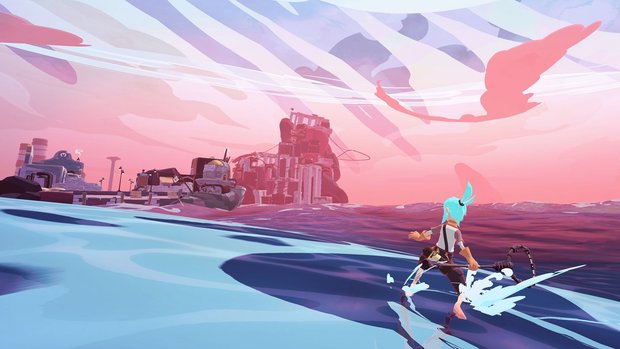
- 0 Comments
Wavetale is a platforming adventure with a timeless quality, evocative of some of my GameCube favourites while not wholly relying on nostalgia to make its mark. The game is straightforward, simple, and relatively short, but thanks to its cel-shading and stupendous ocean environment, it is constantly engaging and stunning to behold. A thoughtful and timely narrative complements the engaging action-packed 3D adventuring, making it (mostly) a delight to play. Though it threatens to drown under its own performance hiccups from time to time, it is well worth persevering through these potential frustrations. Much like the generational divide portrayed by the characters in-game, perhaps Wavetale’s greatest triumph is in showing that people from all generations can come together to make a difference – or at the very least, enjoy the same types of video games.
The game is set in a flooded world. On a collection of tiny islands, small groups and individuals make their living, sailing to one another to communicate and trade goods. You take the role of Sigrid, a teenage girl living on a lighthouse island. Her mother passed away when she was little, leaving Sigrid’s grandmother as her primary caregiver. The two are in charge of the lighthouse that breaks through the Gloom, a black oil-like fog that hovers over the ocean, poisoning and consuming anyone who goes into it. Thus, in order to keep sailing routes open, the lighthouse’s continued operation is essential. All machines are powered by Sparks – jellyfish-like creatures that can be found floating about on land, harvested for their electrical charge. Upon initially gaining control of Sigrid, players are tasked with travelling around the island to catch Sparks with her handy net, bringing them back to the lighthouse for power.
Just as Sigrid and her grandmother begin charging the lighthouse, a Gloom storm descends on the surrounding islands, setting loose throngs of vicious slug-looking creatures coated in shimmering black oil, and trapping citizens in thick suits of sludge. Soon after, Sigrid is knocked into the water. However, instead of sinking into the depths, she is lifted back to safety by a humanoid creature who can mirror her every step like a shadow, allowing Sigrid to walk, and surf, atop the water. With this mysterious friend, Sigrid makes her way to the surrounding islands to rescue fellow residents, collect Sparks, and repower the lighthouse, allowing it to cut through the Gloom and unlock new parts of the ocean to explore.
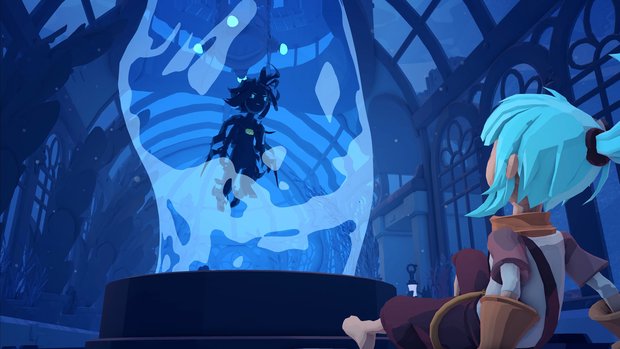
As you progress, you learn that a company named Dandelion once created a factory for extracting Sparks. The economy boomed, but the impact on the environment was substantial, and divides between the citizens working for the company and those who saw their homeland being negatively affected by the drilling came into conflict. Eventually the factory was sabotaged by a group referred to as The Dirty Paws, who still exist, flying an airship that the locals believe controls the Gloom. Sigrid has always believed her grandmother, but she slowly comes to realize the story she’s been told by her elders may not be wholly factual. This is heightened by the fact that the “shadow” creature following her seemingly resembles the creatures from the Gloom. Furthermore, you’ll find paper remnants of the earlier world that make Sigrid begin to question the narrative, like part of an electoral campaign poster that causes her to ponder who her grandmother voted for.
It all effectively mirrors the tensions between millennials and the baby boomers, with feelings of resentment and anger about the state of the planet and economy apparent between the different groups. Having Sigrid caught in between is a thoughtful way to navigate these feelings, and helps illuminate this conflict in a more understanding light. The story threads the needle between myth and metaphor very well, and while it is a not-so-subtle stand-in for the consequences of oil and fracking on the economy, culture, and the environment, one can stand back and simply appreciate it as a tale about fighting back smog monsters without much thought of politics.
Sigrid is a likable protagonist, believably acted with both the bravery and naivety of a teenager. She’s also written as more or less androgynous, making for an easy avatar to assume. Fully voiced cinematics play regularly but never overstay their welcome between gameplay segments. There are voiced bits of chatter during gameplay as well, such as when Sigrid and her grandmother travel between islands and Sigrid asks her questions, like what an apple was before the flood. Other segments, like interacting with NPCs for side quests, are not voiced, but this doesn’t affect the enjoyment of them in any major way. Some of these voiceless segments are used in place of cinematics, however, prompting you to scroll through boxes of text before being unceremoniously transported to a new area to complete your next objective, instead of allowing you to travel there of your own volition. These segments are few in number, but feel as though they’re awkward stand-ins for cutscenes that weren’t completed.
Wavetale is a short game, only running about four and a half hours for a first playthrough, though you can add a few more to that number if you want to go about collecting and completing every challenge it has to offer. The conclusion is mostly satisfying, though the emotional impact is slightly dampened by the fact that the game progresses at such a brisk pace that we only get a short amount of time to become acquainted with each character. Their personalities are well-developed through dialog and character design, but their greater place in the world is somewhat underdeveloped. Still, it’s a minor point, as what’s here is just so good that I wish there had been a few more quests to embark on before reaching the end.
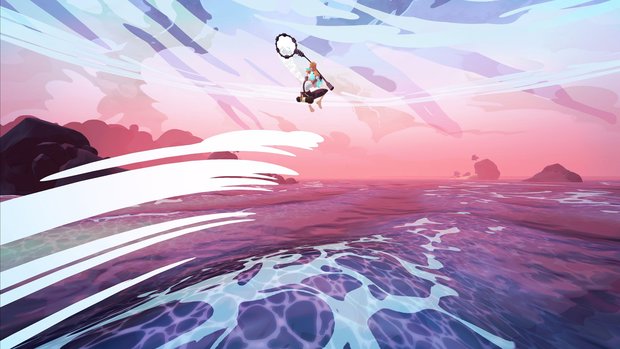
There is a compass at the top of the screen marking your next destination, as well as a quest log on the side conveying your current objectives, but you’re generally free to roam as you please. At first, the area of play is quite small, comprising only a handful of islands, most of which are uninhabited. But as you complete story objectives and power the lighthouse, the traversable ocean becomes more expansive. That’s not to say it’s quite on the scale of comparable sailing adventures like The Wind Waker or Beyond Good and Evil, however; travelling from one end of the map all the way to the other only takes around four to five minutes. That said, there are lots of places to explore, with plenty of collectibles like Sparklings (mini Sparks used as currency to purchase new outfits), scraps of paper (a rarity in a water-logged world), and citizens waiting to dole out side quests, mostly of the fetch variety. Details on quests, both main and side, are tracked in Sigrid’s notebook, allowing you to view a map of the ocean and points of interest therein, toggling navigation points on Sigrid’s compass on or off.
Sparklings are abundant. I had hundreds of them by the end of the game, and the only things I could spend them on were new outfits for Sigrid. You’ll likely have more than enough to buy anything you like quite early on, meaning Sparklings are more collectibles for the sake of collecting, though that will undoubtedly appeal to completionists. The side quests are short, generally tied to different characters’ predicaments after the storm. You'll be searching for lost pets, tools, and other personal effects, usually in the nearby vicinity. I was about a full hour in before I found myself backtracking, looking for items and quests I had missed. New opportunities increase as you play, but the world isn’t so littered with points of interest that it becomes overwhelming. Everything feels like it has a place in Wavetale’s cozy, small-town (or rather, small-sea) setting.
Exploration is the name of the game, and navigating the mix of natural seaside scenery, quaint villages, and industrial ruins is mostly pleasurable. Some environments require alteration in order to navigate. Generators may need to be turned on, and subsequent breakers flipped, in order to restore power to an island’s infrastructure. Though some of the switches take a little bit of platforming to reach, the goal is always clear, and no one island is so big that you’ll find yourself lost for where to go next. Though each story section has its “puzzles,” they’re more or less a sequential series of steps the game guides you to, only requiring you to successfully run and climb or fight your way through.
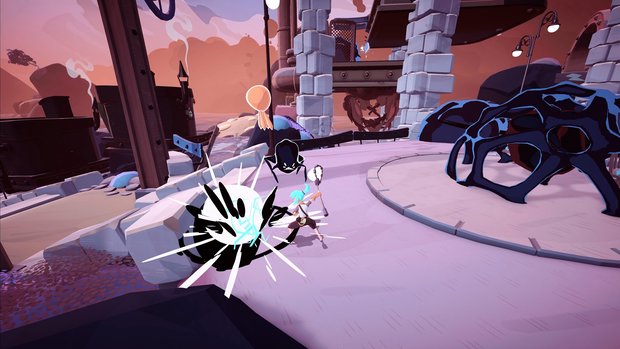
Even without a thorough tutorial, a quick look at the control layout in the options menu tells you just about all you need to get started. The game supports controllers on PC, though I opted to play with a keyboard and mouse. Sigrid is controlled with the WASD keys and the mouse is used for looking/aiming in the direction you want her to travel. The left mouse button is used for attacking with Sigrid’s Spark net, and the CTRL key for performing a spinning attack that hits enemies on all sides. Other standard keys are used for jumping, running (when on land), surfing (while on the water), and diving (when in the air). Sigrid can also double jump, glide down slowly by spinning her net overhead like a helicopter blade, and ground-pound to hit enemies or press buttons. She’s also able to dash, which is useful when surrounded by enemies or when bridging an extra-long gap, and grapple to electrified points with her net.
Most of the architecture in Wavetale is accessible, and I hardly ever found myself blocked by invisible walls. You have to read your environment, looking for places to glide or grapple to, but it’s usually evident where you need to go. Holding the right mouse button slows down time, allowing you to aim your net at grapple points, effortlessly swinging about the environment. The controls feel a bit slippery at first, with Sigrid sliding a few paces forward should you still be holding a directional button upon landing on a platform, but they are easy to get the hang of after a few minutes of play.
The heights you’ll reach in some of these segments as you circumvent towers and mountains is awe-inspiring, and makes you feel like you’re completing a challenge far greater than it actually is. And the ocean is littered with leftover infrastructure, like half pipes filled with oil, becoming a playground for Sigrid to slide and jump between if she gets bored of surfing. There are even several optional obstacle courses throughout the ocean, should you want to test your skills in a more challenging gauntlet than offered by the main campaign.
Most of the enemies are of the aforementioned oil slug variety, though tougher variants and boss creatures incorporate bits of trash in their designs, looking like zombified remnants of industry brought back to life. Combat is semi-frequent, both on land and on water, though it doesn’t require much finesse. Your one attack button can string together a simple two-hit combo in rapid succession, allowing you to button mash your way through most encounters. Harder enemies, or large groups, may be dispatched with a ground pound or spinning attack, and dashing can be useful for escaping the occasional attack. However, Sigrid’s hits stun enemies, meaning they are essentially helpless to fight back once you’ve started hitting them. With a generous health bar that regenerates very quickly, taking the odd hit doesn’t mean much.
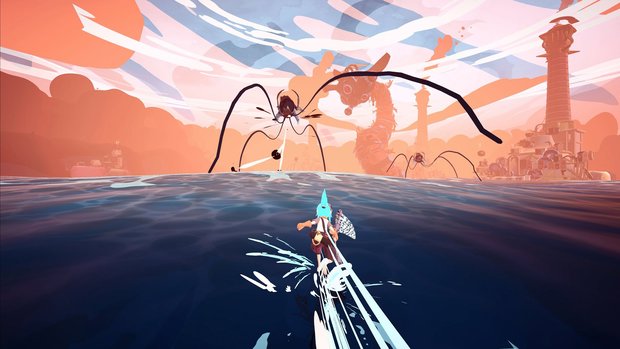
The only time combat and platforming come together in a challenging way during the main campaign is the end boss, which will undoubtedly test your reflexes, though it’s not so great a leap in difficulty that it will stall you for long.
What may occasionally halt progress is the game’s performance. My first session was marred by frame drops and momentary freezes. During platforming segments, these hiccups would often mean I sent Sigrid flying off course in the middle of a jump, or missed hitting a grapple point, resulting in a restart of the segment from the ground level. Strangely, upon subsequent returns to the game, it ran relatively smoothly in this regard. Not every issue was so easily resolved, however. I also clipped through the ground after beating the end boss, having to reload the checkpoint (which luckily was right before I fell through the floor, not at the start of the fight). I also fell into the environment on a few occasions, sending the camera into a jitter before the game spit me out back at the start of the climb. The game crashed on me once as well, and when I booted it up again I had lost a side quest from Sigrid’s notebook.
Wavetale is mostly forgiving with its aiming and hit detection, allowing you to jump and slide about even in a rather haphazard manner, so some of these instances of clipping can perhaps be attributed to the game being too loose with its collision detection, but they are nonetheless frustrating. Game crashes and stuttering are less acceptable, making the otherwise enjoyable platforming into a chore when they occur. (They weren’t due to hardware limitations, as I opted to go with the default setting GeForce Now implemented for their rig, which they claim is optimized for every game. Regardless, even Wavetale’s recommended system requirements don’t come close to maxing out the specs of the machine I was playing on.)
Along with Sigrid, the other main characters are almost all fully voiced, and every actor does a great job of bringing the cast to life, matching the whimsical polygonal character designs. The cel-shading looks great, and the purposely lower-poly designs make the game look like a children's storybook, in the best way possible. Faces are textured with flat eyes and mouths, animated with jittery frames, making them look all the more cartoony. One nitpick is that aesthetic changes made to Sigrid (new costume pieces, hair colours, etc.) aren’t reflected in the cinematics, but this is a minor, understandable detail.
The ocean surface is translucent and reflective, which makes it look more realistic but doesn’t clash with the rest of the game’s often pastel-coloured aesthetic. Gliding across these rolling waves is pleasant, and with the day/night cycles, spending a few minutes peacefully surfing across the water can be a magical experience. The bliss in simply gliding between islands, looking out at the beautiful world around you is one of the most enjoyable aspects. Once you complete the game, a Free Roam mode is unlocked, allowing you to complete any side objectives you missed, or just to continue exploring.
Other touches, like the dynamic soundtrack and the tinting of the screen as enemies close in, add to the atmosphere and keep the pace feeling brisk, providing continual feedback depending on what’s currently happening on-screen. The music is a great collection of flute melodies that becomes more voracious and upbeat with other instruments as you climb or perform daring actions, but stays mellow as you surf the waves or wander the beach.
Final Verdict
Wavetale’s brisk pace means you can blow through it in a session or two. I wish the world had been a bit bigger and the story a bit longer, but what’s here is fluid, accessible to gamers of all ages and abilities, and mostly enjoyable whenever technical issues aren’t handicapping the experience. It’s not a traditional adventure game by any means, but fans of leisurely 3D platformers will surely enjoy it, or anyone looking for a breezy action-adventure with a great atmosphere and decent number of collectibles to keep you occupied. Wavetale may not rewrite the genre it emulates, but it tells a potent story of its own in a beautiful water-drenched world you’ll love exploring.
Hot take
Wavetale’s forgiving platforming and trivial combat arguably make the game a bit too easy, but its thoughtful narrative and gorgeous world will keep you happily glued to the screen throughout the entirety of its brief duration.
Pros
- Beautiful cel-shaded storybook visuals
- Expansive rolling ocean littered with traversable islands makes for an immersive world to explore
- Thoughtful, exciting narrative that works on multiple levels
- High-flying acrobatic platforming is fluid and satisfying to pull off
Cons
- Fairly straightforward progression with little challenge
- Story could have been just a little longer
- Several notable performance issues
Drew played Wavetale on PC using a review code provided by the game's publisher.


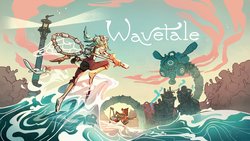
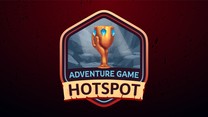






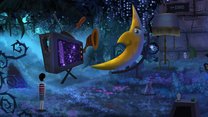
0 Comments
Want to join the discussion? Leave a comment as guest, sign in or register in our forums.
Leave a comment